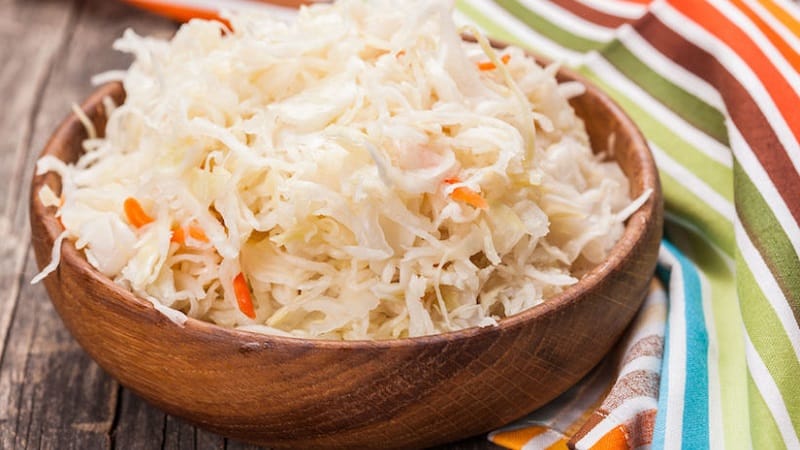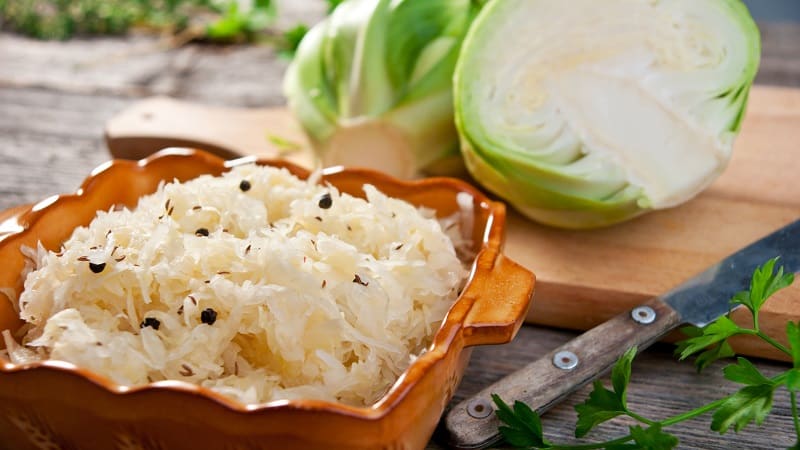We are creating a diet for a nursing mother that will not harm: is it possible to have sauerkraut while breastfeeding?
Sauerkraut is rich in vitamins and other valuable elements. However, its use may cause bloating. There is no clear answer to the question of whether this dish can be consumed while breastfeeding. Many mothers completely exclude sauerkraut from their diet. But such precautions are not always justified.
Is it possible to eat sauerkraut while breastfeeding?
The benefit of cabbage lies in its rich vitamin composition. This is especially true in winter, when there is a lack of fresh plant food. But in some cases, eating cabbage is contraindicated.

Composition, properties
Cabbage contains the following beneficial substances:
- retinol;
- ascorbic acid;
- B vitamins;
- potassium;
- magnesium;
- iron;
- boron and other valuable elements.
The vegetable has a number of useful properties:
- normalizes the functioning of the digestive tract;
- improves metabolism;
- normalizes metabolism;
- helps get rid of extra pounds;
- stabilizes the level of acidity in the body;
- has a preventive effect against ulcers and malignant neoplasms;
- calms the nervous system, helps get rid of stress and depression;
- reduces blood glucose levels;
- rids the body of harmful microorganisms;
- fights pain and inflammation;
- used as an additional agent in the treatment of thrush;
- activates the immune system, gives vital energy;
- used for vitamin deficiency;
- slows down aging, improves the condition of the epidermis;
- relieves swelling and prevents milk stagnation during breastfeeding;
- Cabbage juice is used as a remedy for nausea.
Contraindications
Having many beneficial properties, the fermented product also has a number of contraindications due to the content of acid, salts, preservatives and spices. For this reason, the dish is prohibited for consumption by people with gastrointestinal diseases. Eating an acidic product can lead to increased gas formation and heartburn. This is especially dangerous for stomach ulcers and gastritis.
Sauerkraut is also contraindicated for people with disorders of the pancreas and thyroid glands, as well as liver and kidney diseases. Eating an acidic product in this case can increase the symptoms of the disease.
People with heart problems will also have to avoid this dish.
Benefits and harms for the mother
Eating sauerkraut has a positive effect on the body of a nursing woman.
The dish has the following properties:
- the product is rich in fiber and helps normalize digestive processes, therefore it is indicated for women suffering from constipation;
- source of useful microelements;
- cabbage contains natural antibiotics that prevent decay processes in the intestines;
- consuming this product improves appetite, which is important for women during breastfeeding, since the quality of lactation depends on adequate nutrition.
The danger for a nursing mother is that cabbage can sometimes lead to fermentation processes in the stomach.
Reference. Use sauerkraut does not always affect the properties of breast milk. The likelihood that the baby will experience the same problems as the mother after feeding is small. All foods that a woman eats enter the baby’s stomach after being “processed” by the mother’s body.
For a child
According to experts, sauerkraut is an aggressive food product that can cause bloating and colic in a newborn. Therefore, nursing mothers are advised to stop using it for six months after giving birth.
Reference. If the mother has a great desire to eat a little sour vegetable, she can allow herself to do so. It is recommended to use 1-2 tablespoons of the product. Then it is recommended to monitor the condition of the newborn. If any changes occur, you should postpone eating cabbage for a while.
Rules for use during lactation
Considering the risk of deterioration in the child’s health, a nursing mother should introduce sauerkraut into her diet with caution. To avoid adverse consequences, you should adhere to certain rules.

How and when to introduce it into the diet
It is recommended to introduce sauerkraut into the diet after the child reaches six months of age.
For 1.5 months after the birth of the baby, the mother must adhere to strict diets. Up to three months there are also certain restrictions. At 4-5 months you can gradually expand the menu. For each product there is a recommended period for introduction into the diet.For sauerkraut this is six months. It is important that it does not contain large quantities of vinegar and seasonings.
First, it is recommended to introduce the product as part of other dishes. Experts advise using cabbage soup for this purpose. The soup is boiled and contains many other ingredients. The amount of cabbage in it is small.
If changing the mother's diet does not have an adverse effect on the child's body, you can use the product to prepare a vinaigrette. It is allowed to eat stewed sauerkraut as a side dish for main dishes.
If all the experiments went without consequences, you can introduce sauerkraut into the menu of a nursing mother in its natural form.
What time of day and how much is there?

A new product should be introduced into the diet of a nursing woman in the first half of the day. If the baby has an allergic reaction, symptoms will appear within 12 hours and the mother will notice them in time.
It is recommended to start with a small amount, gradually increasing the portion. The daily norm is 100-150 g. If a child experiences bloating or colic, you should stop using the product.
What to combine with
If the baby does not have a negative reaction to sauerkraut, a nursing woman can eat it in its natural or stewed form, in combination with meat dishes, in soups, salads, and as a filling for dumplings.
Is it possible to give it to a child, at what age?
You can give sauerkraut to a child in small quantities from 2-3 years old. Digestive processes are finally formed at the age of five. From now on, the child can consume up to 100 g of sauerkraut per meal.
What kind of sauerkraut can you use, what recipe?
Breastfeeding women are not recommended to eat food purchased in a store or market. It is better to prepare it yourself without using preservatives, vinegar or seasonings.
To do this you will need:
- 3 kg of white cabbage;
- 2 medium sized carrots;
- 1 tbsp. l. Sahara;
- 2 tbsp. with salt.
The cabbage is finely chopped, the carrots are grated on a coarse grater. Mix the vegetables, add sugar, salt and crush with your hands to form juice. The mixture is placed in an enamel bowl, covered with a plate and a weight is placed on top. If after 3-4 days foam or bubbles appear on the surface, the dish is ready.
Attention. To prevent the cabbage from having a bitter taste, it is recommended to make 5-6 punctures every day in several places with a wooden stick or knitting needle to remove gas.
The finished product is placed in the refrigerator.
Recipes with sauerkraut for nursing mothers (cabbage soup, salads, etc.)

To prepare cabbage soup for a nursing woman you will need:
- 500-700 g of meat (veal, beef or chicken);
- 300 g sauerkraut;
- potatoes – 3-4 pcs.;
- carrots – 1 pc.;
- 1 tbsp. l. tomato paste or 2 fresh tomatoes;
- 2 tbsp. l. vegetable oil;
- greenery;
- salt and pepper to taste.
The meat is poured with water and brought to a boil. The liquid is drained, the meat and the pan are washed. Pour clean water and cook the meat until done. Vegetables are peeled and cut. Place cabbage in salted broth and cook for 30 minutes. Add potatoes. Meanwhile, prepare the dressing. Pour vegetable oil into a frying pan and simmer the onions and carrots. At the end, add tomato paste or peeled and chopped tomatoes. When the vegetables are ready, add the dressing to the pan, bring to a boil and sprinkle the dish with herbs.
To prepare the vinaigrette you will need: beets, carrots, potatoes, sauerkraut, sunflower oil, salt. Potatoes, beets and carrots are washed and boiled. Boiled vegetables are peeled and cut into cubes. Add lightly squeezed sauerkraut. All ingredients are mixed, seasoned with oil and salt.
To prepare sauerkraut salad with leeks you will need:
- 1.5-2 tbsp. sauerkraut;
- 250 g leeks;
- 0.5 tbsp. sour cream;
- 1 tbsp. l. dill or caraway seeds;
- salt.
Place the cabbage in a colander and allow the brine to drain. Leeks are peeled, washed and cut together with the leaves. Mix the vegetables, add dill or caraway seeds, season with sour cream and salt.
Conclusion
Many nursing mothers have a question: is eating sauerkraut allowed while breastfeeding? This product can be introduced into the diet of a nursing woman six months after childbirth. If an allergic reaction or bloating occurs in a child, it is necessary to stop eating the dish for several months or until the end of breastfeeding.